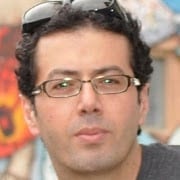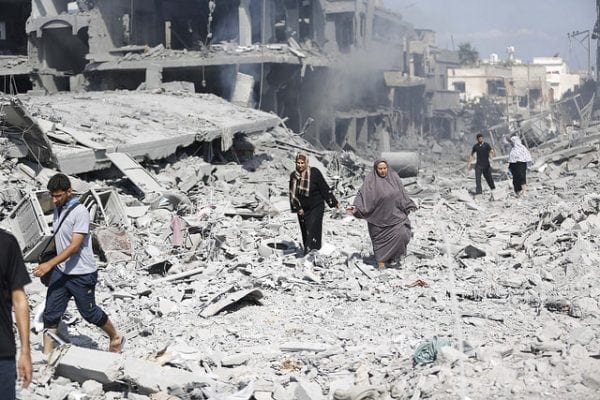Praying for Freedom: Why Is Israel Silencing the Call for Prayer in Jerusalem?
![]() Ramzy Baroud, PhD
Ramzy Baroud, PhD
Politics for the People
As I was growing up, I was always reassured by the sound of the ‘Muadhin’ making the call for prayer in our refugee camp’s main mosque in Gaza. Whenever I heard the call very early in the morning, announcing in a melodic voice that the time for the ‘Fajr’ (dawn) prayer was upon us, I knew it was safe to go to sleep.
Of course, the call for prayer in Islam, like the sound of church bells ringing, carries a deep religious and spiritual meaning, as it has, five times a day, for the last 15 centuries, uninterrupted. But, in Palestine, such religious traditions also carry a deep, symbolic meaning.
For the refugees in my camp, the dawn prayer meant that the Israeli army had departed the camp, ending their terrifying and violent nightly raids, leaving the refugees behind, either mourning their dead, wounded or detained, and freeing the ‘Muadhin’ to open the mosque’s old, rusty doors, and announce to the faithful that a new day had arrived.
It was almost impossible to go to sleep during those days of the First Palestinian Uprising, when collective punishment of Palestinian communities throughout the Occupied Territories crossed every tolerable line.
That was before the mosque in our camp – the Nuseirat Refugee Camp in central Gaza Strip – was raided, along with other mosques, and the Imam was arrested. When the mosque’s doors were sealed shut by orders from the army, ordinary people climbed to the roofs of their homes during the military curfew and announced the call for prayer, anyway.
Even our ‘communist’ neighbor did – a man, we were told, who had never stepped foot inside a mosque all of his life!
It was no longer just a religious matter but an act of collective defiance, proving that even orders from the army would not silence the voice of the people.
The call for prayer meant continuity; survival; rebirth; hope and layer-upon-layer of meanings that was never truly understood, but always feared by the Israeli army.

Farouk mosque of an-Nuseirat Refugee Camp bombed in 2014
The onslaught on the mosques never ended.
According to government and media reports, a third of Gaza’s mosques were destroyed in the 2014 Israeli war on the Strip. 73 mosques were entirely destroyed by missiles and bombs and 205 were partially demolished. This includes Al-Omari Mosque in Gaza, which dates back to 649 AD.
It also includes the main mosque of Nuseirat, where the call for prayer throughout my childhood gave me enough peace and calm to go to sleep.
Now, Israel is trying to ban the call for prayer in various Palestinian communities, starting in Occupied East Jerusalem.
The ban came only a few weeks after the United Nations culture and education organization, UNESCO, had passed two resolutions condemning Israel’s illegal practices in the occupied Arab city.
UNESCO demanded that Israel ceases such practices, which violate international law and attempt to alter the status quo of a city that is central to all monotheistic religions.
After staging an unsuccessful campaign to counter the UN’s effort, going as far as accusing the international institution of anti-Semitism, Israeli officials are now carrying out punitive measures: collectively punishing the non-Jewish residents of Jerusalem for UNESCO’s verdicts.
This includes the construction of yet more illegal Jewish homes, the threat to demolish thousands of Arab homes, and, as of late, restricting the call for prayer in various mosques.
It all began on November 3, when a small crowd of settlers from the illegal settlement of Pisgat Zeev gathered in front of the home of Israeli Mayor of Jerusalem, Nir Barakat. They demanded that the government ends the ‘noise pollution’, emanating from the city’s mosques.
The ‘noise pollution’- referred to as such by mostly European settlers who arrived in Palestine only recently – are the calls for prayer that have been made in that city since 637 AD, when Caliph Umar entered the city and ordered the respect of all of its inhabitants, regardless of their religious beliefs.
The Israeli mayor readily and immediately obliged. Wasting no time, Israeli soldiers began raiding mosques, including al-Rahman, al-Taybeh and al-Jamia Mosques in the Jerusalem town of Abu Dis.
“Military officials arrived before dawn to inform the muezzins, the men responsible for the call to prayer through the mosques’ public announcement speakers, of the ban and barred local Muslims from reaching the places of worship,” reported International Business Times, citing Ma’an and other media.
Praying five times a day is the second of the five main pillar in Islam, and the call for prayer is the summoning of Muslims to fulfill such a duty. It is also an essential part of Jerusalem’s intrinsic identity where church bells and mosques’ call to prayer often interweave into a harmonic reminder that coexistence is a real possibility.
But no such coexistence is possible with the Israeli army, government and mayor of the city treating Occupied Jerusalem as a platform for political vengeance and collective punishment.
Banning the call for prayer is merely a reminder of Israel’s domination over the wounded Holy City, and a message that Israel’s control exceeds that of tangible existence, into every other sphere.
Israel’s version of settler colonialism is almost unprecedented. It does not simply seek control, but complete supremacy.
When the mosque in my former refugee camp was destroyed, and soon after a few bodies were pulled out from underneath the wreckage to be buried, the camp’s residents prayed atop and around the rubble. This practice was replicated elsewhere in Gaza, not just during the last war, but the previous ones as well.
In Jerusalem, when Palestinians are prevented from reaching their holy places, they often amass behind Israeli army checkpoints and pray. That, too, has been a practice witnessed for nearly fifty years, since Jerusalem fell to the Israeli army.
No amount of coercion and court orders is likely to ever reverse this.
While Israel has the power to detain imams, demolish mosques and prevent calls for prayer, Palestinian faith has displayed far more impressive strength, for, somehow, Jerusalem never ceased calling upon its faithful, and the latter never ceased praying. For freedom, and for peace.
[Initial Photo: Checkpoint at Ramalah]
![]()
 Has been writing about the Middle East for over 20 years. He is an internationally-syndicated columnist, a media consultant, an author of several books and the founder of PalestineChronicle.com. His books include ‘Searching Jenin’, ‘The Second Palestinian Intifada’ and his latest ‘My Father Was a Freedom Fighter: Gaza’s Untold Story’. His website is: www.ramzybaroud.net.
Has been writing about the Middle East for over 20 years. He is an internationally-syndicated columnist, a media consultant, an author of several books and the founder of PalestineChronicle.com. His books include ‘Searching Jenin’, ‘The Second Palestinian Intifada’ and his latest ‘My Father Was a Freedom Fighter: Gaza’s Untold Story’. His website is: www.ramzybaroud.net.
=SUBSCRIBE TODAY! NOTHING TO LOSE, EVERYTHING TO GAIN.=
free • safe • invaluable
[email-subscribers namefield=”YES” desc=”” group=”Public”]





